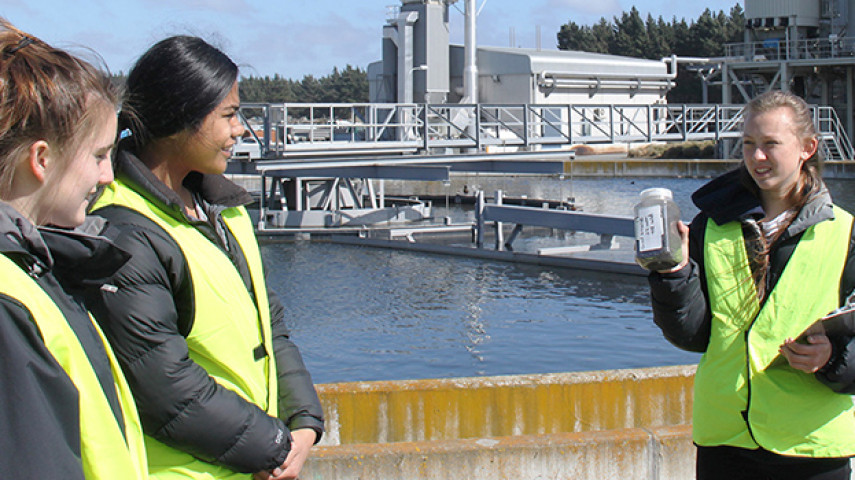What are the three main waterway systems in Christchurch? How do we contribute to them?

We can currently run a modified version of this programme at your school. Please contact us with any enquiries.
Students explore the fascinating wastewater journey at the Christchurch Treatment Plant, including finding out what happens to everything that goes down the drain. Be prepared for a revival of the senses – this can be a smelly one.
Please note special adult:student ratios are required.
Book a Learning Through Action school programme
Risk analysis and management information (RAMS) will be sent out once a programme booking is confirmed. If you require this at any other stage please email LTA@ccc.govt.nz or contact us(external link).

| Year level | 5 to 13 |
|---|---|
| Curriculum Level | 2 to 8 |
| Availability | Currently on hold until further notice |
| Site | Christchurch Waste Water Treatment Plant |
| Cost | Free |
| Number of students | Maximum of 35 |
| Special requirements | Closed in shoes must be worn |
- Sustainability
- Natural cycles for dealing with waste
- Technological processes
- Simple biochemistry
- Personal responsibility for action
- Three waters system
Treat your senses to a visit to the Christchurch Wastewater Treatment plant.
Students will get to see up close how wastewater from a large city goes through an amazing process and is returned to the environment.
Become an expert on different parts of the process, then share the knowledge on an interactive tour of the plant.
Students are challenged to share ways to minimize their impact on our wastewater system by making good decisions.
Closed-in shoes must be worn.
We are learning to:
- Describe one or more parts of the wastewater treatment cycle
- Consider the implications of disposing of liquid waste
- Describe the natural processes that are used in the treatment of wastewater
- Name two key issues about the treatment of wastewater
- Name two by-products from wastewater treatment
- Explain to others the best way to deal with wastewater in Christchurch and justify their decision
- Identify actions they can take to reduce the amount of wastewater produced in their homes.
Using language, symbols and texts
Through investigating oral and visual text, symbols and charts, students will uncover the secrets of the processes taking place at the Christchurch Wastewater Treatment Plant.
Thinking
Students will be able to justify their decisions and contributions to a sustainable wastewater system.
Managing self
Students are encouraged to justify the actions they will take as a result of their understanding of the information they learned in the programme.
Participating and contributing
Students can become actively involved in helping to secure a sustainable future for our communities by identifying ways of maintaining environmentally friendly waster systems.
Relating to others
Students are encouraged to see how they are an important part of the wastewater process, and how their actions can impact on others and the environment.
| Curriculum area | Strand and level | Objective |
|---|---|---|
| Science Pūtaiao |
Nature of Science Levels 2 to 4 |
Investigating in science Communicating in science Participating and contributing |
| Planet Earth and Beyond Levels 2 to 4 |
Earth Systems Interacting systems |
|
| Living World Levels 2 to 8 |
Life processes | |
| Material World Levels 2 to 8 |
Chemistry and society | |
| Technology Hangarau |
Technological Knowledge Levels 2 to 6 |
Technological products Technological systems |
| Nature of Technology Levels 2 to 8 |
Characteristics of technology Characteristics of technological outcomes |
|
| Social Sciences Tikanga ā-Iwi |
Levels 2 to 8 | Social studies Economics |
Level 1
|
Subject |
Standard |
|---|---|
|
Biology |
1.2 AS90926 |
|
Chemistry |
1.2 AS90931 |
|
Science |
1.11 AS90950 |
|
Generic Technology |
1.7 AS91050 |
|
Processing Technologies |
1.61 AS91083 |
Level 2
| Subject | Standard |
|---|---|
| Biology | 2.8 AS91160 |
| Chemistry | 2.3 AS91163 |
| Earth and Space Science | 2.7 AS91193 |
| Education for Sustainability | 2.1 AS90810 2.2 AS90811 2.6 AS90814 2.4 AS91733 |
| Generic Technologies | 2.5 AS91358 |
| Processing Technologies | 2.61 AS91352 |
Level 3
| Subject | Standard |
|---|---|
| Biology | 3.2 AS91602 |
| Chemistry | 3.3 AS91389 |
| Earth and Space Science | 3.2 AS91411 |
| Education for Sustainability | 3.4 AS90831 |
| Generic Technology | 3.5 AS91612 3.8 AS91615 3.10 AS91617 3.13 AS91618 |
Related news

Canterbury Rams and Mainland Pouākai to light up the show court at Parakiore
Parakiore is officially the new home of the Canterbury Rams and Mainland Pouākai basketball teams.
18 Feb 2026
Exemption granted for central city noise plan change
Work will continue on the Central City Noise plan change.
13 Feb 2026
Celebrate Valentine’s Day at Mitre10 Sparks
Mitre10 Sparks will light up the skies this weekend with a special Valentine’s Day themed concert at Hagley Park for lovers of free, open-air music.
9 Feb 2026